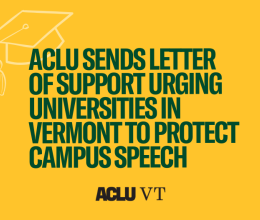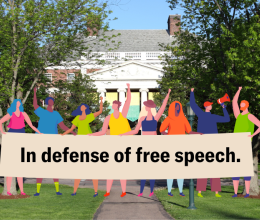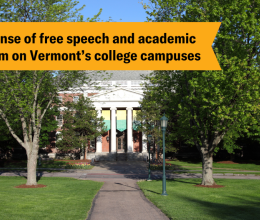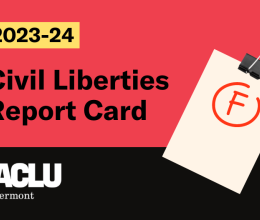
The ACLU filed a lawsuit on behalf of Andrew Cappello, who City of Newport officials served with a “notice against trespass” in August 2021, barring Mr. Cappello from city property. The “no trespass” order was issued at the request of the City’s Public Works Director with an apparent grudge against Mr. Cappello, a former Newport employee.
On August 5, 2021, Mr. Cappello was visiting friends at the Prouty Beach Campground in Newport when the City’s Public Works Director approached, falsely accused Mr. Cappello of harassing city employees, and demanded that he leave. Soon after, a Newport police officer arrived and presented Mr. Cappello with a notice against trespass which ordered him “not to enter upon property that is lawfully possessed by: City of Newport.” The notice had no explanation for why it was issued or instructions on how to contest it.
When Mr. Cappello sought further explanation, the Newport Police Chief would say only that the Public Works Director had instructed him to issue the notice. Mr. Cappello inquired again, noting that he needed to access public property—Gardner Park and Prouty Beach, specifically—to volunteer for his children’s sports teams and for his new job with NorthWoods Stewardship Center. He was told the notice would expire after one year but received no additional information. And, when Mr. Cappello requested an opportunity to petition the city council to lift the notice, the mayor refused.
As a result, Mr. Cappello did not enter City property for months, was unable to visit friends at Prouty Beach Campground, and could not perform some of his job duties. Although Mr. Cappello has visited the parks occasionally since the notice’s expiration in August 2022, he still fears future reprisal.
Public spaces, by definition, should be accessible to all. And yet, in recent years we have seen local officials abusing their authority to bar Vermonters from public places. In some cases, these appear to be retaliatory measures motivated by personal grievances. When officials misuse their power to restrict access to public life, it undermines the values of civic participation and inclusion on which our democracy relies. In this case, Mr. Cappello’s rights were violated, and he deserves to be compensated for blatantly unjust and unlawful treatment.
Mr. Cappello’s case is part of a troubling pattern of local officials excluding Vermonters from public places and civil forums. Last week, the ACLU filed an amicus brief in the case of Montpelier resident Stephen Whitaker, who was forcibly removed from a city council meeting in June 2022 and criminally charged for trespassing. In 2019, the ACLU settled a lawsuit filed on behalf of Jason Ploof challenging a no-trespass order prohibiting him from entering City Hall Park in Burlington; that case settled after the city agreed to policy changes consistent with constitutional requirements. And in 2014, a federal court ruled in favor of ACLU client Marcel Cyr, a Rutland resident banned from attending school board meetings in violation of his free speech and due process rights.
Recognizing that cases like Mr. Cappello’s are a widespread problem in Vermont, the ACLU has urged the Vermont League of Cities and Towns to issue statewide guidance to its members. To date, the League has declined to do so.
Like many Vermont towns, Newport has no criteria or procedures for issuing or challenging trespass notices for public property. It is past time for the League of Cities and Towns to issue statewide guidance on this recurring problem and help establish clearer procedures to protect Vermonters’ rights. Failing that, the legislature should act to protect the fundamental right of Vermont residents to access public spaces.”
Mr. Cappello’s lawsuit was filed in Vermont Superior Court, Orleans Unit. In his complaint, Mr. Cappello asserts that his free speech and due process rights were violated when he was denied access to all City property without an opportunity to challenge the notice. Mr. Cappello further alleges that such targeted and arbitrary mistreatment violated both the Common Benefits Clause of the Vermont Constitution and the Equal Protection Clause of the United States Constitution. He is seeking declaratory and injunctive relief as well as damages.



